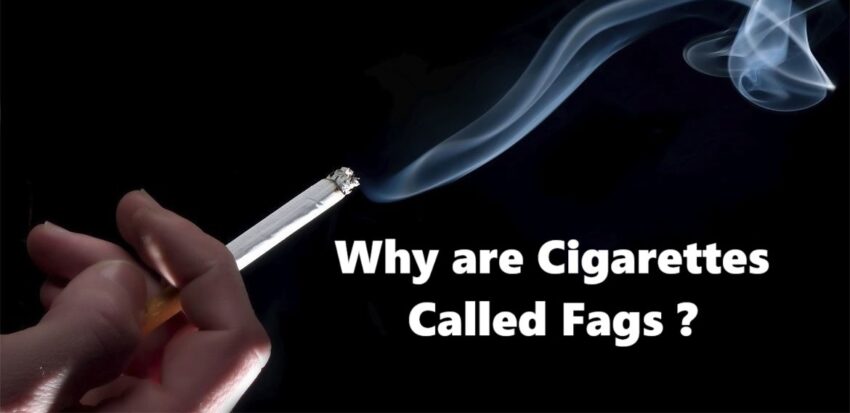Introduction
Have you ever wondered why some people refer to cigarettes as “fags”? It might seem like an unusual connection, but there’s an interesting story behind this slang term. Let’s explore the origins and reasons for using “fag” to describe cigarettes.
Key Highlights:
- The term “fags” for cigarettes has a historical origin that originated in the UK.
- There are two theories explaining the origin of the term “fags” for cigarettes.
- Laws in the UK regarding smoking.
Historical Background Of Why Cigarettes called Fags
There are two theories about why cigarettes are called “fags” in the UK. Let’s look at each one:
Theory 1:

A long time ago, cigarettes had a cork covering on the filter so that when people smoked, their lips wouldn’t stick to the paper part. But as making lots of cigarettes got easier, using real cork became too expensive. So, instead of real cork, they started using colored paper that looked like cork.
These new cigarettes that used fake cork were given the nickname “fakes.” Eventually, the word “fags” came about as a slang term for cigarettes. It’s like they took a part of the word “fakes” and made it shorter to say “fags.”
So, in the UK, people started calling cigarettes “fags” because they used fake cork on the filters. This kind of thing happens with language over time. It’s important to remember to use words that are polite and make sense in the situation.
Theory 2:

The word “fag” has had different meanings throughout history. Initially, it was used to describe a tiring or burdensome task, often given to servants or apprentices. This usage dates back to the 1600s in Britain. Later on, it was also used to describe a younger student who served older students in British public schools.
Slang words can change and develop over time. In the early 1900s, the term “fag” began to be used informally to refer to cigarettes in certain British English circles. This transition from a task to a cigarette might have happened because smoking was seen as a way to take a break from tiring activities.
Playing with Words and Metaphors
The shift from “fag” meaning a task to it meaning a cigarette shows how flexible language can be. Words can change their meanings over time, and “fag” is a great example of that.
Metaphors play a big role in how we understand language. In the case of “fag” and cigarettes, the link might be related to a cigarette burning away, similar to how tasks were described as being “fagged.”
Differences in Regions
Slang terms can be unique to certain regions and spread to others over time. The use of “fag” to mean cigarette didn’t just stay in the UK – it also made its way to other English-speaking countries like Australia and New Zealand.
It’s important to mention that the word “fag” can be offensive when used in certain contexts, especially to insult someone based on their sexuality. This can make using “fag” to refer to cigarettes problematic and hurtful.
How We Use It Today
While fewer people use “fag” to describe cigarettes today due to its potential to offend, the term is still used by some, especially older generations. Many younger people might not even know about its historical meanings.
In modern times, the term “ciggy” is more commonly used instead of “fag” to talk about cigarettes. This shift reflects our changing attitudes and desire to avoid hurtful language.
Smoking Rules UK in 2023

Smoking Ban Overview: Smoking is not allowed in enclosed public spaces and workplaces, with some exceptions. It’s a legal requirement to display clear no-smoking signs where they can be seen by both customers and staff. If you own or manage smoke-free premises, it’s your legal duty to ensure that guests, visitors, and staff don’t smoke there.
Smoking Ban Details: Since July 1, 2007, smoking has been prohibited in enclosed public spaces and workplaces (with certain exceptions) as stated in the Health Act 2006.
Who Does the Act Apply To? Yes, if you own or manage places that are open to the public or used as workplaces by more than one person, including places where goods or services are provided or received by the public.
Note for Wales: The areas where the ban applies, along with definitions and exceptions, are the same as in England, but the signage requirement differs.
Definitions: Enclosed Places: Premises are considered enclosed if they have a ceiling or roof and are fully enclosed (except for doors, windows, or passageways), whether permanently or temporarily.
Substantially Enclosed Areas (50% Rule): Premises are considered substantially enclosed if they have a ceiling or roof (including retractable roofs like awnings) but have permanent openings in the walls (excluding doors or windows) that make up less than half of the total wall area. Temporary structures like tents or marquees are considered enclosed if they fit this definition.
Exemptions: While smoking is banned in indoor public and communal areas of places like attractions, hotels, and guesthouses, there are exceptions:
- Self-contained short-term rental accommodations (like holiday cottages, flats, or caravans) don’t have to be smoke-free, but you can decide whether smoking is allowed in your property.
- Private areas of bed and breakfasts and guesthouses aren’t covered by the ban as long as staff don’t use them.
- Designated smoking bedrooms in hotels, guesthouses, and bed and breakfasts. These rooms must be enclosed, have proper ventilation, close off from non-smoking areas, and be clearly marked.
Remember, providing designated smoking bedrooms is optional and up to the owner’s discretion.
Signage: According to the Smoke-free (Signs) Regulations 2012 (for England only), you must display at least one clear no-smoking sign. The sign’s location and size don’t matter as long as customers and staff can see it.
Enforcement and Penalties: Local authorities are responsible for enforcing the ban. Health officers can enter “no-smoking premises” to ensure the law is followed.
Not displaying proper non-smoking signs can lead to fines. Premises owners/managers are legally obliged to prevent smoking on their premises. Failing to take reasonable steps can result in fines up to £2,500 upon conviction.
Vaping: The smoking ban doesn’t cover e-cigarettes or vaping in enclosed public spaces or workplaces. Operators can decide whether vaping is allowed, limited to specific areas, or prohibited in parts of the premises.
Related Post: What does Notti Bop mean?Frequently Asked Questions about Cigarette Slang
1. Can I still use “fag” to talk about cigarettes? It’s best to avoid it. While it used to be common, it’s now considered offensive in many situations. “Ciggy” is a safer alternative.
2. Why did “fag” start meaning cigarette? The change might be due to metaphors connecting smoking to tasks, along with shifts in language and different ways people talk.
3. Do people still use “fag” for cigarettes today? Not as much as before. “Ciggy” has taken its place, especially among younger people.
4. Is “fag” okay to use in other ways? Even though it had other meanings in the past, it’s best to avoid using it due to its potential to hurt people.
5. How does language change over time? Language changes as society changes. Meanings shift, words get new uses, and what’s acceptable can evolve.
Wrapping It Up
Language changes and grows with time, and the journey of “fag” from describing a task to representing a cigarette is a fascinating one. However, it’s crucial to remember the impact words can have on others and to choose our language thoughtfully.



